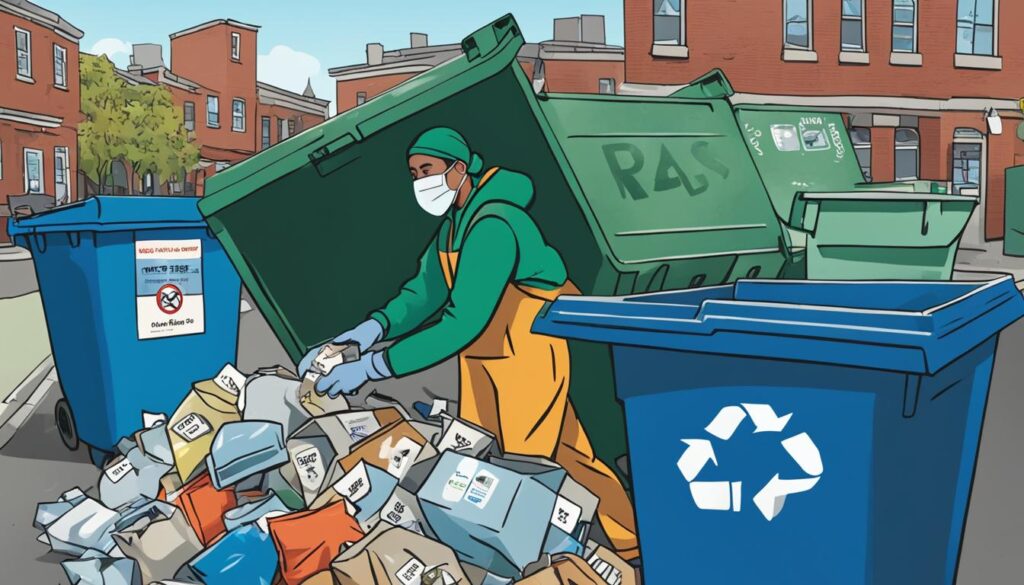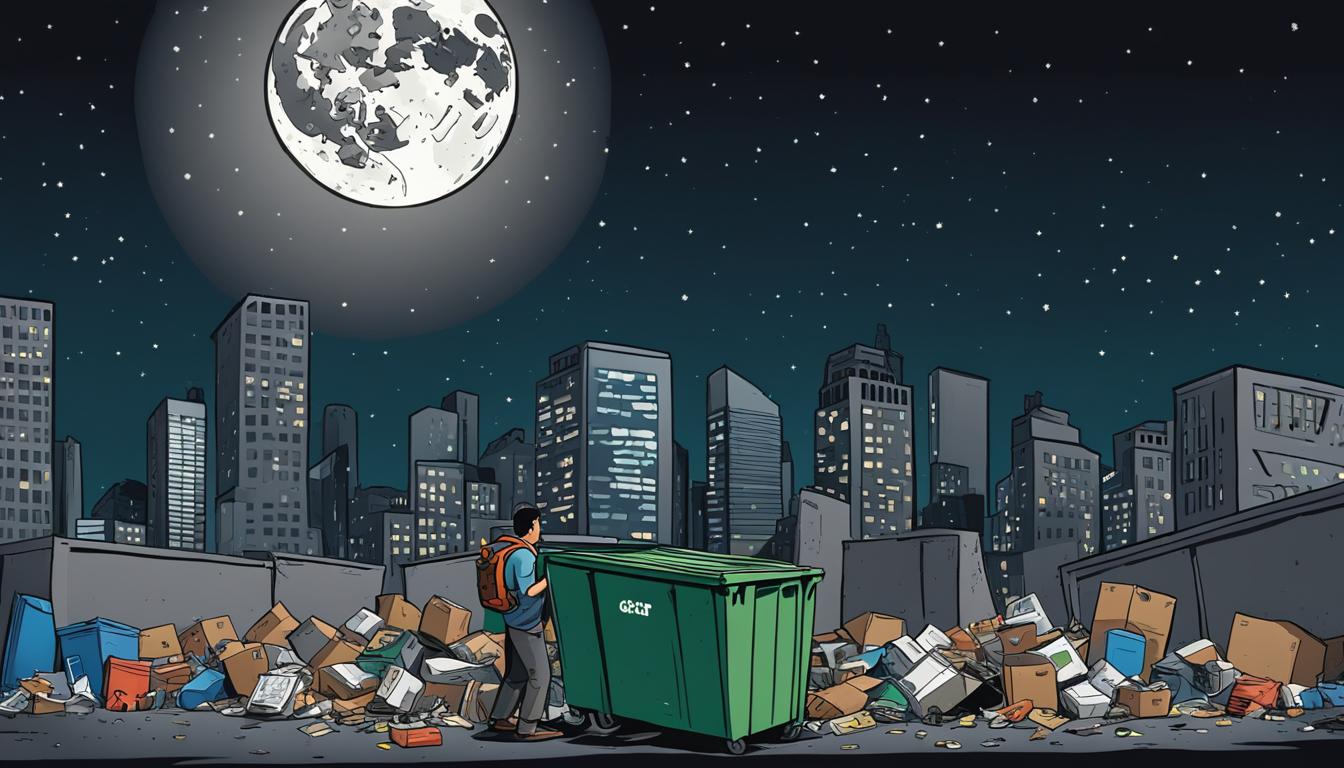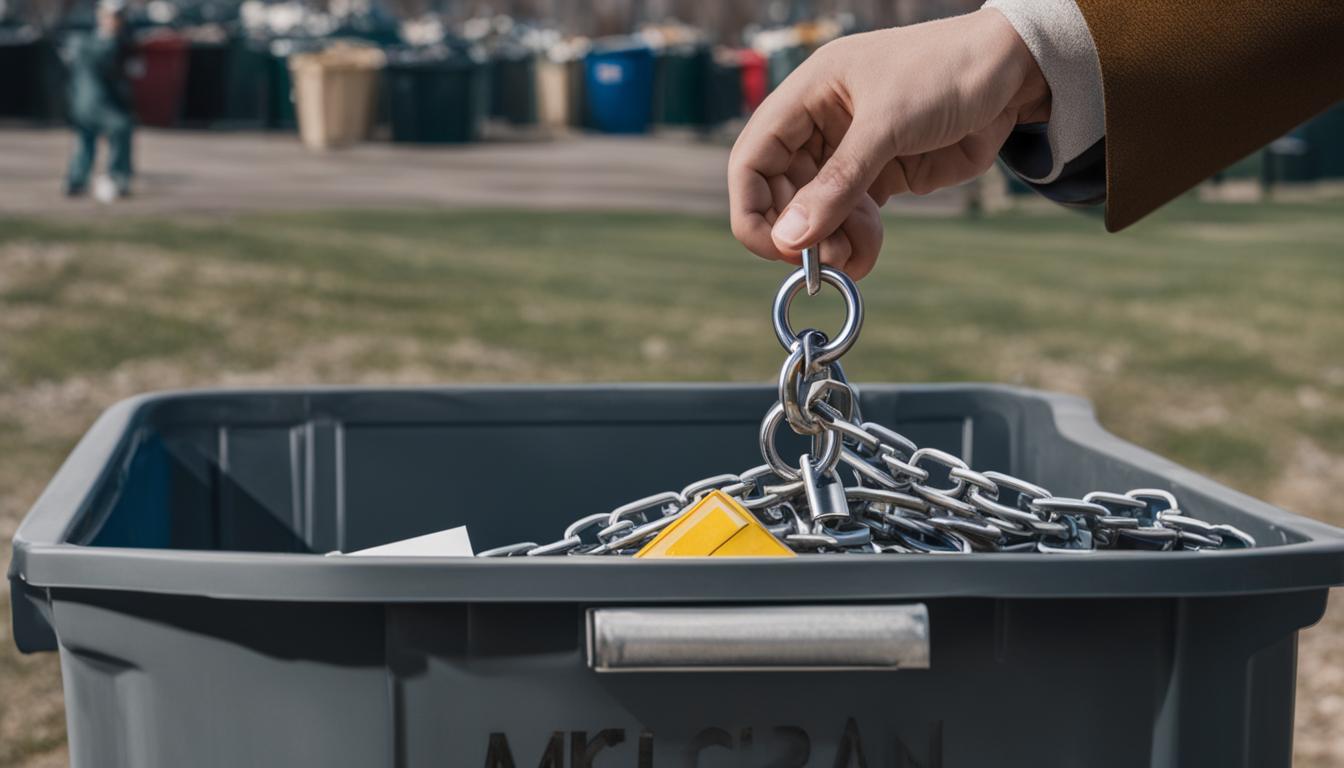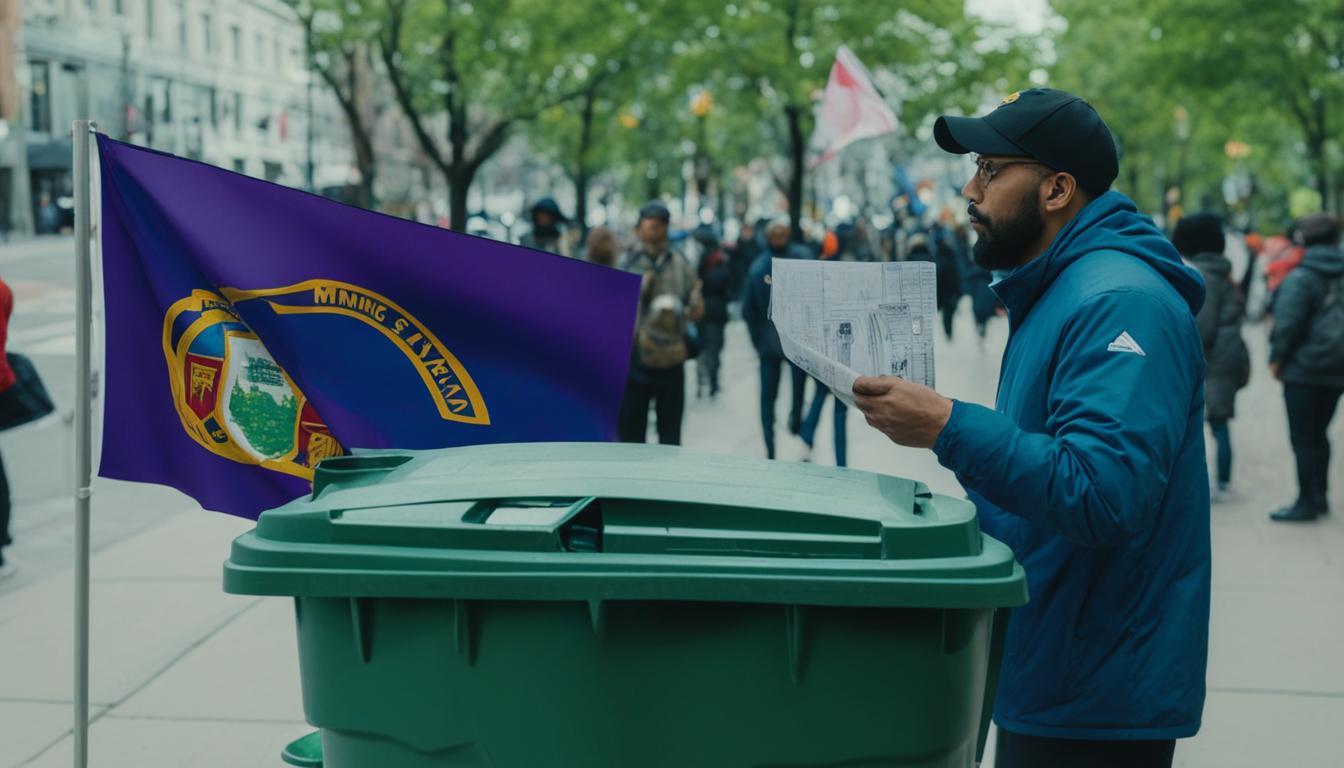Disclosure: This Post Contains Affiliate Links; We earn a commission on purchases.
When it comes to dumpster diving, many people wonder about the legalities of this unusual activity. If you’re in Minnesota and curious about the legality of scavenging through dumpsters, you’ve come to the right place. In this article, we’ll explore the dumpster diving regulations in Minnesota and shed light on the restrictions you should be aware of.
Key Takeaways:
- Dumpster diving is technically legal in all 50 states, including Minnesota, according to a landmark Supreme Court ruling in 1988.
- While dumpster diving itself is legal, it’s essential to check local and city ordinances, as there may be regulations that restrict or prohibit this activity.
- If a dumpster is locked or there are “No Trespassing” signs posted, it’s best to avoid diving in that particular location to stay within the boundaries of the law.
- Engaging in illegal activities while diving, such as trespassing, disorderly conduct, or theft, can result in legal consequences.
- To ensure safe and responsible dumpster diving, it’s vital to be aware of your surroundings, wear protective gear, and only take what you truly need or can repurpose.
The Benefits and Risks of Dumpster Diving
Dumpster diving can be a rewarding activity with both benefits and risks. Understanding these factors is important for anyone considering diving into the world of discarded treasures. Let’s explore the advantages and potential dangers associated with dumpster diving.
The Benefits of Dumpster Diving
Dumpster diving presents several compelling benefits:
- 1. Finding Free Items: One of the main advantages is the opportunity to discover free items that others have discarded. It’s surprising what people throw away, and you might come across valuable items, useful household goods, or even perfectly functioning electronics.
- 2. Environmental Sustainability: Dumpster diving aligns with the principles of reusing and repurposing. By rescuing items from dumpsters, you can reduce waste and promote environmental sustainability. It’s a small but impactful way to contribute to a more eco-friendly lifestyle.
- 3. Cost Savings: Dumpster diving can help you save money. Instead of purchasing items at retail prices, you can find what you need for free. This is particularly helpful for individuals on a tight budget or those looking to live more frugally.
These benefits highlight how dumpster diving can be a resourceful and environmentally conscious activity.
The Risks of Dumpster Diving
While dumpster diving offers numerous advantages, it’s essential to be aware of the associated risks:
- 1. Potential Hazards: Dumpsters may contain sharp objects, broken glass, or potential health hazards, such as chemicals or biohazardous waste. It’s crucial to exercise caution and wear protective gear, including gloves and closed-toe shoes, to minimize the risk of injuries or exposure to harmful substances.
- 2. Legal Consequences: Dumpster diving is generally legal, but engaging in illegal activities while diving can lead to legal consequences. Trespassing on private property or theft can result in legal issues. It’s important to respect private property, follow local regulations, and avoid diving in areas where it is prohibited or unsafe.
Understanding and mitigating these risks is crucial for a safe and enjoyable diving experience.
Safety Tips for Dumpster Diving
To protect yourself while dumpster diving, keep the following safety tips in mind:
- 1. Wear Protective Gear: Use gloves and closed-toe shoes to protect your hands and feet from potential hazards.
- 2. Be Mindful of Your Surroundings: Pay attention to your surroundings to avoid accidents, such as tripping or falling objects.
- 3. Respect Private Property: Avoid trespassing on private property and be aware of any “No Trespassing” signs.
- 4. Dive in Safe Locations: Choose dumpsters in safe areas, such as public spaces, rather than ones hidden away or in dangerous environments.
By following these safety tips, you can minimize risks and ensure a safer diving experience.
The image above represents the excitement of discovering hidden gems amidst discarded items while highlighting the inherent risks involved.
Understanding the Legal Framework for Dumpster Diving
Dumpster diving is a controversial activity that raises questions about its legality and privacy implications. To understand the legal framework surrounding dumpster diving, it’s important to consider the relevant laws and court rulings.
In a significant Supreme Court ruling in 1988, it was established that dumpster diving is protected by the law. The court held that discarded items, once placed in a public area for collection, no longer have an expectation of privacy. This means that the public can legally access and retrieve items from dumpsters without violating any privacy rights.
However, it’s essential to note that the legality of dumpster diving can vary at the local level. Local jurisdictions, cities, or municipalities may have specific regulations or ordinances that restrict or prohibit dumpster diving. These laws aim to maintain order, ensure public safety, and prevent trespassing on private property.
Private property owners have the right to restrict access to their dumpsters or designate them as off-limits. If a dumpster is locked or if there are “No Trespassing” signs around it, it is crucial to respect the property owner’s wishes and refrain from diving in that particular location to avoid potential legal issues.
To avoid trespassing laws, it is wise to only access dumpsters located in public areas, such as those behind commercial establishments. This ensures that you are not encroaching on private property and eliminates the risk of violating trespassing laws.
In summary, while dumpster diving is generally legal based on the Supreme Court ruling, it is crucial to be aware of and comply with any local regulations or ordinances that may impact the legality of dumpster diving in your area. Avoid diving in locked or private dumpsters and respect any “No Trespassing” signs to prevent potential legal repercussions.
Privacy Expectations for Discarded Items
“One man’s trash is another man’s treasure” – the saying holds true in the context of dumpster diving. Once items are discarded and no longer in the possession of the original owner, they lose any reasonable expectation of privacy. This principle was affirmed by the Supreme Court ruling on dumpster diving, which recognized that discarded items in public areas are available for public access.
Trespassing Laws
Dumpster diving should be conducted with respect for property rights and within the boundaries of the law. It is important to be aware of and understand the trespassing laws in your jurisdiction to avoid any legal issues.
Tips for Responsible Dumpster Diving
When engaging in dumpster diving, it’s important to approach it responsibly and ethically. By following these guidelines, you can minimize waste, leave dumpsters clean, and ensure a positive impact on the environment.
- Leave No Trace: After diving, make sure to leave the dumpster clean and organized. This demonstrates respect for the property and consideration for others who might also utilize the dumpster.
- Minimize Waste: Be mindful of the waste generated during your diving activities. Only take what you genuinely need or can repurpose effectively. This approach reduces unnecessary waste and promotes sustainability.
- Focus on Discarded Items: When diving, prioritize items that are truly discarded and not readily available through other channels, such as thrift stores or donation centers. This ensures that you are genuinely reducing waste and not impeding others’ access to necessary resources.
- Prioritize Safety: Always prioritize your safety when dumpster diving. Wear appropriate protective gear, such as gloves and closed-toe shoes, to safeguard against potential hazards. Avoid diving in dumpsters that may contain potentially dangerous materials or substances.
By adhering to these tips, you can engage in responsible dumpster diving that benefits both yourself and the environment. Remember, dumpster diving can be a meaningful way to repurpose discarded items and minimize waste, as long as it is done with respect and consideration.

Public Perception and Stigma Surrounding Dumpster Diving
Dumpster diving is a controversial topic with diverse public opinions. While some individuals view it as a practical and resourceful way to find useful items, others perceive it as unsightly or even a form of public nuisance. The varying attitudes towards dumpster diving can be influenced by social and economic factors, as well as cultural norms.
Historically, dumpster diving has been associated with poverty and homelessness, leading to a negative stigma surrounding the activity. Many people tend to view scavenging as a last resort for those facing economic hardships, rather than recognizing it as a means of reducing waste and promoting sustainability. Additionally, the act of searching through discarded items can be seen as unconventional or unattractive by some members of society.
However, there has been a shift in attitudes towards dumpster diving in recent years. As more people become aware of the environmental and economic benefits of reducing waste, there is a growing recognition of the value and purpose behind scavenging. Dumpster diving aligns with the principles of recycling and repurposing, helping to divert usable items from landfills and giving them a second life.
Social and economic factors also influence perceptions of dumpster diving. In communities where sustainable living and environmental consciousness are prioritized, dumpster diving may be viewed more favorably. Additionally, as the cost of living continues to rise, more individuals are turning to alternative methods of acquiring goods and reducing expenses, including dumpster diving.
Changing Attitudes and the Future
The changing attitudes towards dumpster diving indicate a potential shift in public perception and the decrease of stigma surrounding this activity. As the environmental and economic benefits become more widely recognized, individuals and communities may be more accepting and supportive of the practice.
By challenging misconceptions and promoting a deeper understanding of the value behind dumpster diving, it is possible to change the narrative and break down the stigma. Education and awareness about responsible scavenging practices can help dispel the notion that dumpster diving is solely associated with poverty or desperation.
As public opinion continues to evolve, it is important to foster discussions and engage in constructive dialogue around the topic of dumpster diving. By highlighting the positive impact it can have on waste reduction and resourcefulness, we can encourage a more inclusive and sustainable society.
| Factors Influencing Perception of Dumpster Diving | Impact on Public Opinion |
|---|---|
| Social and economic factors | Can influence views on scavenging as a necessity or a choice. |
| Cultural norms | Determine whether dumpster diving is accepted or seen as unconventional. |
| Environmental consciousness | Leads to increased acceptance of dumpster diving as a way to reduce waste. |
| Education and awareness | Can help combat stigma by promoting the environmental and economic benefits. |
Conclusion
In conclusion, dumpster diving is a legal activity in Minnesota, as well as in all 50 states. However, it’s important to be aware of any local restrictions or regulations that may apply. Dumpster diving offers a unique opportunity to find valuable items that others have discarded, while also contributing to waste reduction and environmental sustainability.
While engaging in dumpster diving, it is crucial to prioritize safety and follow proper precautions. This includes wearing protective gear such as gloves and closed-toe shoes, as well as being cautious of potential hazards within the dumpsters. Additionally, it is essential to respect private property and adhere to any “No Trespassing” signs or locked dumpsters.
By practicing responsible diving techniques, you can enjoy the benefits of dumpster diving while minimizing any potential risks or legal issues. Remember to leave the dumpsters clean and organized, only take what you need or can repurpose, and consider the environmental impact of your actions. As attitudes towards dumpster diving continue to evolve, it is important to promote a positive perception of this activity by acting responsibly and respecting the communities in which you dive.
Source Links
- https://kxrb.com/is-it-legal-to-dumpster-dive-in-minnesota/
- https://worldpopulationreview.com/state-rankings/dumpster-diving-legal-states
- https://www.legalmatch.com/law-library/article/is-dumpster-diving-illegal.html

Subscribe to Our Newsletter










